英语助动词的功能
- 格式:doc
- 大小:23.00 KB
- 文档页数:1
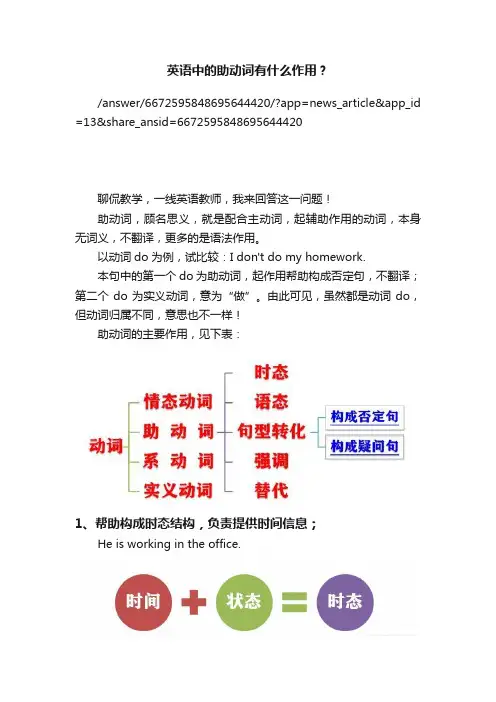
英语中的助动词有什么作用?/answer/6672595848695644420/?app=news_article&app_id =13&share_ansid=6672595848695644420聊侃教学,一线英语教师,我来回答这一问题!助动词,顾名思义,就是配合主动词,起辅助作用的动词,本身无词义,不翻译,更多的是语法作用。
以动词do为例,试比较:I don't do my homework.本句中的第一个do为助动词,起作用帮助构成否定句,不翻译;第二个do为实义动词,意为“做”。
由此可见,虽然都是动词do,但动词归属不同,意思也不一样!助动词的主要作用,见下表:1、帮助构成时态结构,负责提供时间信息;He is working in the office.上句中,助动词is与主动词working共同构成现在进行时,并为我们提供时间信息:现在,working为我们提供动作的状态信息,表明动作正在进行。
Jimmy was sitting inthe room.上句中was为助动词,表明时间为:过去,与sitting共同构成过去进行时;2、帮助构成语态语态结构be+pp;Hundreds of trees are planted every spring.上句中,助动词are与planted共同构成语态结构,意为:被种植。
3、帮助实现各种句式变化;(1)与否定副词not连用,共同构成否定句;He goes to work at seven every day.上述例句变否定句,需借助助动词does与否定副词not,即:He doesn't go to work at at seven every day.(2)帮助构成疑问句;Do you like your life in Shanghai? 你喜欢大学生活吗?4、加强语气,起强调作用;Do remember to come to my birthday party this evening.I did do the thing yesterday.(昨天我的确做过这件事。
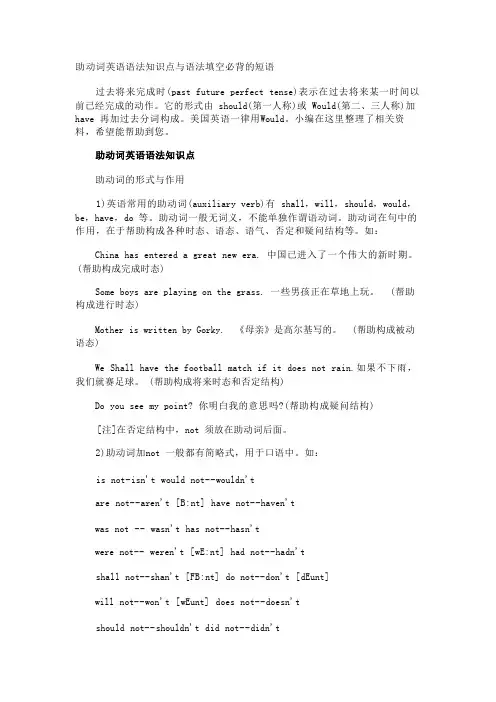
助动词英语语法知识点与语法填空必背的短语过去将来完成时(past future perfect tense)表示在过去将来某一时间以前已经完成的动作。
它的形式由 should(第一人称)或 Would(第二、三人称)加have 再加过去分词构成。
美国英语一律用Would。
小编在这里整理了相关资料,希望能帮助到您。
助动词的形式与作用1)英语常用的助动词(auxiliary verb)有 shall,will,should,would,be,have,do 等。
助动词一般无词义,不能单独作谓语动词。
助动词在句中的作用,在于帮助构成各种时态、语态、语气、否定和疑问结构等。
如:China has entered a great new era. 中国已进入了一个伟大的新时期。
(帮助构成完成时态)Some boys are playing on the grass. 一些男孩正在草地上玩。
(帮助构成进行时态)Mother is written by Gorky. 《母亲》是高尔基写的。
(帮助构成被动语态)We Shall have the football match if it does not rain.如果不下雨,我们就赛足球。
(帮助构成将来时态和否定结构)Do you see my point? 你明白我的意思吗?(帮助构成疑问结构)[注]在否定结构中,not 须放在助动词后面。
2)助动词加not 一般都有简略式,用于口语中。
如:is not-isn't would not--wouldn'tare not--aren't [B:nt] have not--haven'twas not -- wasn't has not--hasn'twere not-- weren't [wE:nt] had not--hadn'tshall not--shan't [FB:nt] do not--don't [dEunt]will not--won't [wEunt] does not--doesn'tshould not--shouldn't did not--didn'tbe助动词be 的形式变化和动词be。
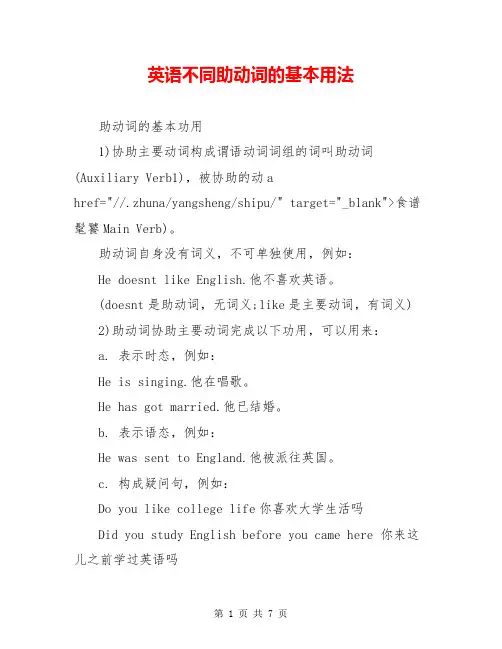
英语不同助动词的基本用法助动词的基本功用1)协助主要动词构成谓语动词词组的词叫助动词(Auxiliary Verb1),被协助的动ahref="//.zhuna/yangsheng/shipu/" target="_blank">食谱髦饕Main Verb)。
助动词自身没有词义,不可单独使用,例如:He doesnt like English.他不喜欢英语。
(doesnt是助动词,无词义;like是主要动词,有词义)2)助动词协助主要动词完成以下功用,可以用来:a. 表示时态,例如:He is singing.他在唱歌。
He has got married.他已结婚。
b. 表示语态,例如:He was sent to England.他被派往英国。
c. 构成疑问句,例如:Do you like college life你喜欢大学生活吗Did you study English before you came here 你来这儿之前学过英语吗d. 与否定副词not合用,构成否定句,例如:I dont like him.我不喜欢他。
e. 加强语气,例如:Do e to the party tomorrow evening. 明天晚上一定来参加晚会。
He did know that.他的确知道那件事。
3)最常用的助动词有:be,have,do,shall,will,should,would助动词be的用法1)be +现在分词,构成进行时态,例如:They are having a meeting.他们正在开会。
English is being more and more important. 英语现在越来越重要。
2)be + 过去分词,构成被动语态,例如:The window was broken by Tom 窗户是汤姆打碎的。
English is taught throughout2 the world.世界各地都教英语。
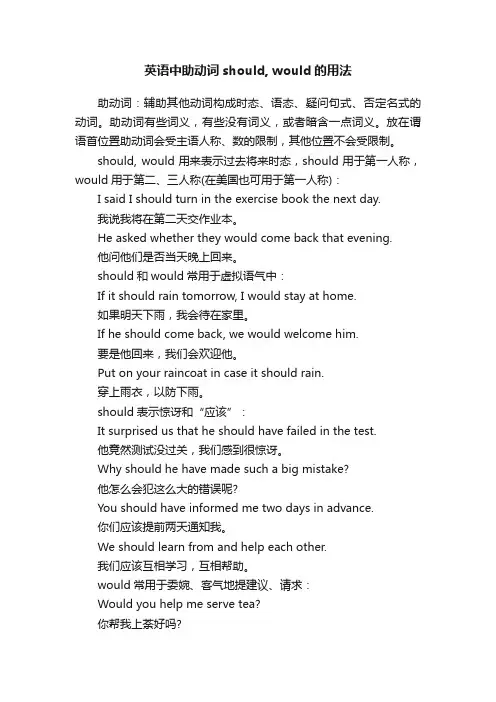
英语中助动词should, would的用法助动词:辅助其他动词构成时态、语态、疑问句式、否定名式的动词。
助动词有些词义,有些没有词义,或者暗含一点词义。
放在谓语首位置助动词会受主语人称、数的限制,其他位置不会受限制。
should, would用来表示过去将来时态,should用于第一人称,would用于第二、三人称(在美国也可用于第一人称):I said I should turn in the exercise book the next day.我说我将在第二天交作业本。
He asked whether they would come back that evening.他问他们是否当天晚上回来。
should和would常用于虚拟语气中:If it should rain tomorrow, I would stay at home.如果明天下雨,我会待在家里。
If he should come back, we would welcome him.要是他回来,我们会欢迎他。
Put on your raincoat in case it should rain.穿上雨衣,以防下雨。
should表示惊讶和“应该”:It surprised us that he should have failed in the test.他竟然测试没过关,我们感到很惊讶。
Why should he have made such a big mistake?他怎么会犯这么大的错误呢?You should have informed me two days in advance.你们应该提前两天通知我。
We should learn from and help each other.我们应该互相学习,互相帮助。
would常用于委婉、客气地提建议、请求:Would you help me serve tea?你帮我上荼好吗?What would you like to eat?你想吃点什么呢?I’d like some vanilla ice-cream.我想要些香草冰淇淋。
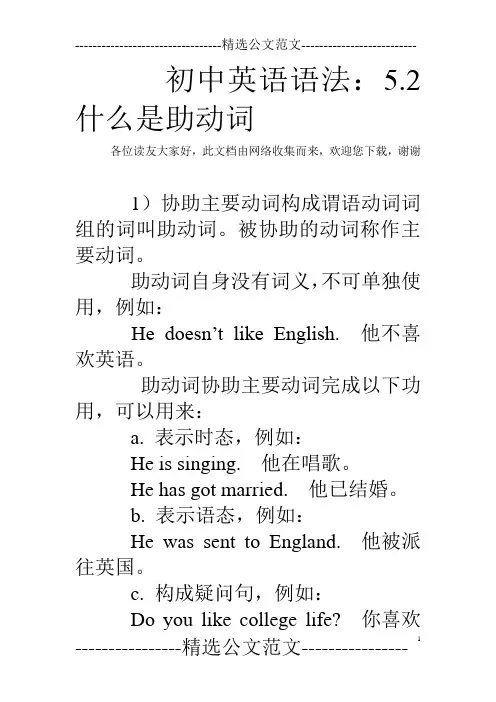
初中英语语法:5.2 什么是助动词
各位读友大家好,此文档由网络收集而来,欢迎您下载,谢谢
1)协助主要动词构成谓语动词词组的词叫助动词。
被协助的动词称作主要动词。
助动词自身没有词义,不可单独使用,例如:
He doesn’t like English.他不喜欢英语。
助动词协助主要动词完成以下功用,可以用来:
a. 表示时态,例如:
He is singing.他在唱歌。
He has got married.他已结婚。
b. 表示语态,例如:
He was sent to England.他被派往英国。
c. 构成疑问句,例如:
Do you like college life?你喜欢大
学生活吗?
Did you study English before you came here?你来这儿之前学过英语吗?
d. 与否定副词not合用,构成否定句,例如:
I don’t like him.我不喜欢他。
e. 加强语气,例如:
Do come to the party tomorrow evening. 明天晚上一定来参加晚会。
He did know that.他的确知道那件事。
3)最常用的助动词有:be, have, do, shall, will, should, would
各位读友大家好,此文档由网络收集而来,欢迎您下载,谢谢。

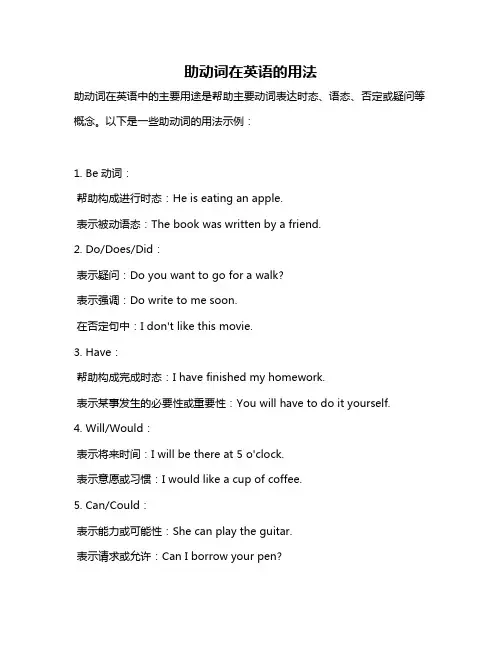
助动词在英语的用法助动词在英语中的主要用途是帮助主要动词表达时态、语态、否定或疑问等概念。
以下是一些助动词的用法示例:1. Be动词:帮助构成进行时态:He is eating an apple.表示被动语态:The book was written by a friend.2. Do/Does/Did:表示疑问:Do you want to go for a walk?表示强调:Do write to me soon.在否定句中:I don't like this movie.3. Have:帮助构成完成时态:I have finished my homework.表示某事发生的必要性或重要性:You will have to do it yourself.4. Will/Would:表示将来时间:I will be there at 5 o'clock.表示意愿或习惯:I would like a cup of coffee.5. Can/Could:表示能力或可能性:She can play the guitar.表示请求或允许:Can I borrow your pen?6. May/Might:表示可能性或允许:It might rain later.表示请求或询问:May I use your phone?7. Must/Mustn:表示必须或必要:You must finish your homework.表示推测:He must be at home now.8. Ought to:表示应该或责任:You ought to help others when they are in trouble.9. Shall/Should/Would (较为少用,现在已逐渐被助动词"should"替代):在某些疑问句中表示建议或提议:What shall we do this weekend? 10. 助动词的否定形式:通常在助动词后面加上“not”来表示否定,例如“I don't know”表示“我不知道”。
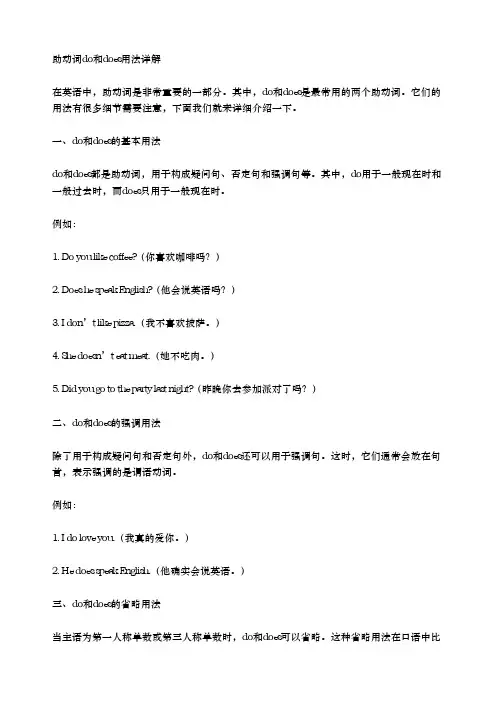
助动词do和does用法详解在英语中,助动词是非常重要的一部分。
其中,do和does是最常用的两个助动词。
它们的用法有很多细节需要注意,下面我们就来详细介绍一下。
一、do和does的基本用法do和does都是助动词,用于构成疑问句、否定句和强调句等。
其中,do用于一般现在时和一般过去时,而does只用于一般现在时。
例如:1. Do you like coffee?(你喜欢咖啡吗?)2. Does he speak English?(他会说英语吗?)3. I don’t like pizza.(我不喜欢披萨。
)4. She doesn’t eat meat.(她不吃肉。
)5. Did you go to the party last night?(昨晚你去参加派对了吗?)二、do和does的强调用法除了用于构成疑问句和否定句外,do和does还可以用于强调句。
这时,它们通常会放在句首,表示强调的是谓语动词。
例如:1. I do love you.(我真的爱你。
)2. He does speak English.(他确实会说英语。
)三、do和does的省略用法当主语为第一人称单数或第三人称单数时,do和does可以省略。
这种省略用法在口语中比较常见。
例如:1. Do you like coffee? → You like coffee?2. Does he speak English? → He speaks English?四、do和does的替换用法为了避免重复,do和does有时也可以替换其他动词。
这种替换用法通常出现在口语中。
例如:1. A: Can you come to my party tonight?B: I’ll do that.(我会去的。
)2. A: Does she like pizza?B: She does.(她喜欢。
)五、do和does的注意事项1. 当do和does用于疑问句时,它们应该放在主语之前。
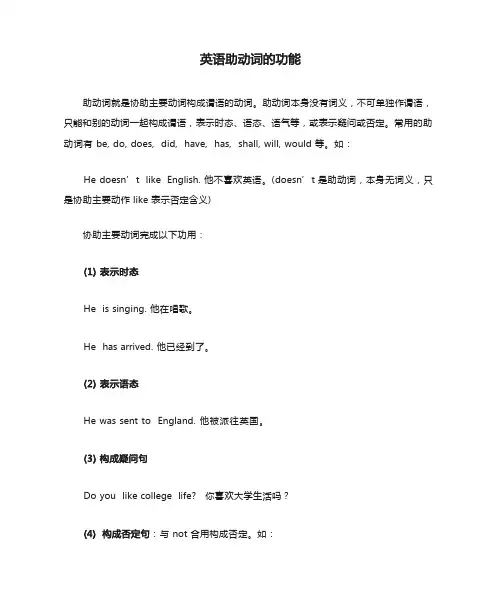
助动词就是协助主要动词构成谓语的动词。
助动词本身没有词义,不可单独作谓语,只能和别的动词一起构成谓语,表示时态、语态、语气等,或表示疑问或否定。
常用的助动词有 be, do, does, did, have, has, shall, will, would 等。
如:
He doesn’t like English. 他不喜欢英语。
(doesn’t 是助动词,本身无词义,只是协助主要动作 like 表示否定含义)
协助主要动词完成以下功用:
He is singing. 他在唱歌。
He has arrived. 他已经到了。
He was sent to England. 他被派往英国。
Do you like college life? 你喜欢大学生活吗?
not 合用构成否定。
如:
I don’t like him. 我不喜欢他。
I do love you. 我真的喜欢你。
Never did I hear of such a thing. 我从未听说过这样的事情。
He works hard than you do. 他比你工作努力些。
(do 代替 work)。
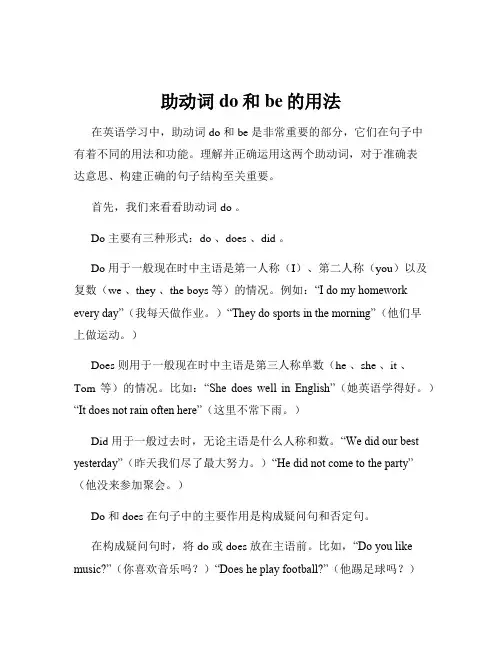
助动词do和be的用法在英语学习中,助动词 do 和 be 是非常重要的部分,它们在句子中有着不同的用法和功能。
理解并正确运用这两个助动词,对于准确表达意思、构建正确的句子结构至关重要。
首先,我们来看看助动词 do 。
Do 主要有三种形式:do 、does 、did 。
Do 用于一般现在时中主语是第一人称(I)、第二人称(you)以及复数(we 、they 、the boys 等)的情况。
例如:“I do my homework every day”(我每天做作业。
)“They do sports in the morning”(他们早上做运动。
)Does 则用于一般现在时中主语是第三人称单数(he 、she 、it 、Tom 等)的情况。
比如:“She does well in English”(她英语学得好。
)“It does not rain often here”(这里不常下雨。
)Did 用于一般过去时,无论主语是什么人称和数。
“We did our best yesterday”(昨天我们尽了最大努力。
)“He did not come to the party”(他没来参加聚会。
)Do 和 does 在句子中的主要作用是构成疑问句和否定句。
在构成疑问句时,将 do 或 does 放在主语前。
比如,“Do you like music?”(你喜欢音乐吗?)“Does he play football?”(他踢足球吗?)如果句子中有实义动词,在否定句中要在实义动词前加 don't 或 doesn't 。
例如,“I don't watch TV at night”(我晚上不看电视。
)“She doesn't have lunch at school”(她不在学校吃午饭。
)接下来,我们说说助动词 be 。
Be 有 am 、is 、are 、was 、were 这几种形式。
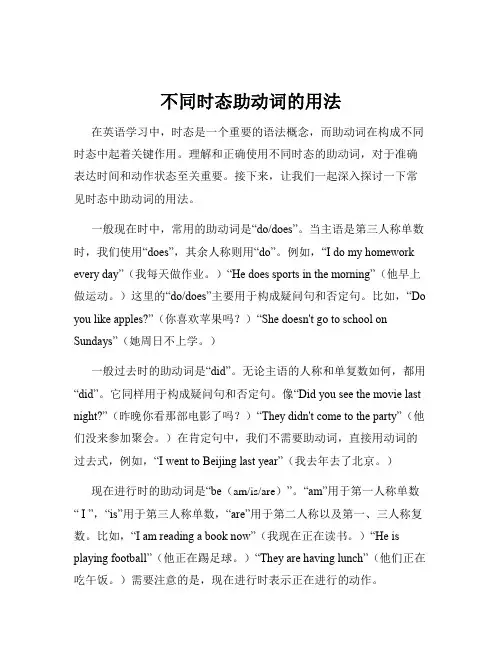
不同时态助动词的用法在英语学习中,时态是一个重要的语法概念,而助动词在构成不同时态中起着关键作用。
理解和正确使用不同时态的助动词,对于准确表达时间和动作状态至关重要。
接下来,让我们一起深入探讨一下常见时态中助动词的用法。
一般现在时中,常用的助动词是“do/does”。
当主语是第三人称单数时,我们使用“does”,其余人称则用“do”。
例如,“I do my homework every day”(我每天做作业。
)“He does sports in the morning”(他早上做运动。
)这里的“do/does”主要用于构成疑问句和否定句。
比如,“Do you like apples?”(你喜欢苹果吗?)“She doesn't go to school on Sundays”(她周日不上学。
)一般过去时的助动词是“did”。
无论主语的人称和单复数如何,都用“did”。
它同样用于构成疑问句和否定句。
像“Did you see the movie last night?”(昨晚你看那部电影了吗?)“They didn't come to the party”(他们没来参加聚会。
)在肯定句中,我们不需要助动词,直接用动词的过去式,例如,“I went to Beijing last year”(我去年去了北京。
)现在进行时的助动词是“be(am/is/are)”。
“am”用于第一人称单数“ I ”,“is”用于第三人称单数,“are”用于第二人称以及第一、三人称复数。
比如,“I am reading a book now”(我现在正在读书。
)“He is playing football”(他正在踢足球。
)“They are having lunch”(他们正在吃午饭。
)需要注意的是,现在进行时表示正在进行的动作。
过去进行时的助动词是“be(was/were)”。
“was”用于第一人称单数和第三人称单数,“were”用于第二人称以及第一、三人称复数。
为什么会存在助动词作者:cobeEmail:*****************时间:2018年12月25日助动词在英语中称之为 Auxiliary Verb,顾名思义称之为“附加动词”应该更为准确。
这个“附加动词”是附加在主要动词(Main Verb)之前的,主要是为了帮助主动词,所以又称之为助动词。
常见的助动词有 do、be、have、will、shall当然,did、am、was、are、were、had、would、should等也是,它们只不过是上面助动词原形的变形形式。
助动词本身是没有什么词义的,不可单独使用。
既然助动词没有词义,为什么又要存在呢?当然它在句中起到很大的作用。
助动词主要的功用一是构成疑问句,二是表示动词状态,三是用来表否定。
我们从助动词的功能入手,来说明助动词存在的意义。
1.疑问句中助动词的作用讲到疑问句,我们势必要讲到英语与汉语的一个重要区别,在英语中,习惯把重要的内容提到句前,汉语却没有这个习惯,反而经常把重要的内容放到后面去。
比如最简单的主系表结构:You are student.我现在要对主语进行提问,那么我把you变成疑问代词Who,因为Who是我最关心的内容,所以要将疑问代词置于句子最前面,故疑问句变成了Who are student?我现在要对宾语进行提问,那么我把student变成who,现在我最关心的内容是who,所以要将疑问代词who置于句子最前面,故疑问句变成了Who are you?我现在对are产生了疑问,我不知道你到底是还是不是学生,因此,我要对are进行提问,那么我把are提到句子最前面,疑问句变成了Are you student?在主系表结构中,表语与主语其实是为同一体的,你是学生,学生是你,倒来倒去,并不影响大体意思。
但是,再分析主谓宾结构试试看。
例如最简单主谓宾结构:You like movie.如果我们现在对like产生了疑问,不确定你是否真的喜欢电影。
英汉助动词对比助动词(Auxiliary Verb)是指在主要动词与宾语之间,起到连接、协调或补充作用的动词。
英汉语言中,助动词的运用具有很大差异。
本文将从助动词的种类、用法、语义等方面进行对比分析。
一、助动词种类对比1.英语助动词:英语助动词种类相对较少,主要包括:be(是)、have(有)、do(做)、be going to(打算)、should(应该)、would(会)、as(当、作为)、be able to(能够)等。
2.汉语助动词:汉语助动词较为复杂,包括:是、有、得、地、得来、着、了、过、来、中、得等。
其中,得来、着了、来、中、得等动词后还可加副词表示某种动作程度。
二、助动词用法对比1.英语助动词:英语助动词主要用于时态、语态、助动词+be动词构成主谓结构,表示一般现在时、一般过去时、一般将来时等。
此外,还可以用作情态动词,表示推测、建议、意愿等。
2.汉语助动词:汉语助动词可用于动词本身,表示动作的发生、进行、完成;也可用作动词的补语,表示某种动作的状态。
此外,还可用于使役动词、形容词、副词等,表示动作的程度、对象等。
三、助动词语义对比1.英语助动词:英语助动词强调主语的动作,表示主语的状态,如:是表示“存在”、做表示“进行”、be going to表示“打算”等。
2.汉语助动词:汉语助动词强调动词与宾语之间的时态、语态,表示动词的某种状态或动作发生的时间、地点等,如:有表示“存在”、着了表示“进行”、来表示“发生”等。
四、结论英汉助动词在种类、用法、语义等方面存在较大差异。
英语助动词主要用于时态、语态,表示主语的状态;汉语助动词则强调动词与宾语之间的时态、语态,表示动词的某种状态或动作发生的时间、地点等。
这些差异反映了英汉语言在助动词运用上的差异,也影响到两者的交流和理解。
初中英语语法:助动词(do,does)的用法do:aux.构成疑问句和否定句; 代替动词; 用于加强语气;vt.做; 干; 进行; 从事;vi.表现; 进展; 引起; 行过;n.社交聚会; 社交活动; 宴会;复数:dos 过去式:did 现在分词:doing 过去分词:done 第三人称单数:does [例句]Why did you do that?你为什么要那样做?What did you do?你到底做了什么?doesconj.做,有用,工作;v.做( do的第三人称单数); 干; 学习; 研究;n.雌鹿(或雌兔、雌羚羊等)( doe的名词复数);例句:What does he mean?他说的是什么意思啊?Does she work here?她是不是在这儿工作?助动词(do,does)的用法1)当句子为肯定句时不涉及使用助动词,只涉及“主谓一致”原则。
2)当句子为否定句时,要根据主语的人称来决定使用相应的助动词:当主语为“三单”时,要使用does;当主语为“非三单”时,用助动词原形do。
3)当句子变疑问句时,同样要根据句子的主语来决定在句首使用Do或Does.一般现在时用do和does,比如always,usually,often、every day(year)……第一人称、第二人称和名词复数用do(I、you、we、they、cats、dogs、~s等)第三人称和名词单数用does(he、she、it、cat、dog等)例句:I do the homework.He does the homework.do主语第一人称does主语第三人称。
常见的助动词有:be(无词义),do(无词义),have(无词义),shall 将要,will 将要。
一、be 的助动词用法be 作为助动词,用来构成进行时态和被动语态。
如:We are working hard in the garden.(构成现在进行时)我们在花园里辛勤劳动。
The house was painted purple.(构成被动语态)房子被刷成紫色的。
二、do 的助动词用法do 作为助动词,用来构成疑问句、否定句、强调句。
如:Do you live in Shanghai?(构成疑问句)你住在上海吗?I don't like to have hamburgers.(构成否定句)我不喜欢吃汉堡包。
Do come please.(构成强调句)一定要来。
三、have 的助动词用法have 作为助动词,用来构成完成时态。
如:Have you finished the work?(构成现在完成时)你的工作完成了没有?四、shall 和will 的助动词用法shall 和will 作为助动词,用来构成将来时态。
如:I will call you this evening.(构成一般将来时)今晚我会打电话给你。
What shall we do next week?下个星期我们做什么?初一英语助动词练习助动词一单选题(本题共25小题,共计100分)1:She ________ to see documentaries(记录片).A、do wantB、 don't wantC、doesn't wantD、not want2:Look at that picture on the wall. __________ you like it?A、DoB、CanC、CouldD、Are3:He ________ like pears.A、 doB、isC、doesn'tD、not4:—Do you often go to the cinema______ Sunday?—No, we__________.A、on, don'tB、on, aren'tC、in, doD、in, don't5:-Can you see a light on the table?-Yes, ________.A、I amB、I’m notC、I canD、He isn’t6:—Does the boy want to be an actor? —________.A、 Yes, he isB、No, he doesC、Yes, he doesD、No, he isn't7:_________ he have any apples ?A、DoB、DoesC、IsD、Are8:She ______ want to be a policewoman, because she thinks it’s kind of dangerous.A、 isn’tB、aren’tC、don’tD、doesn’t9:Why____he have brown hair?A、 doB、doesC、isD、has10:What time__________ he get home every day?A、isB、doesC、doD、am11:What________ you see in the picture?A、isB、areC、canD、have12:Jack_______ like flying kites______ throwing a frisby.A、don't, orB、doesn't, andC、 don't, andD、doesn't, or 13:A:________ Jim ________ a ball?B:No, he________.A、Do, have, don'tB、Does, has, doesn'tC、Is, have, isn't D、Does, have, doesn't14:I ________ have a watch.A、 am notB、doesC、don'tD、doesn't15:____you____a good time on your vacation?A、Did; haveB、Did; hadC、Were; haveD、Were; had 16:Simon likes _____ football, but he doesn’t _____ it well.A、 play, playsB、to play, playsC、plays, playingD、playing, play17:She____have to wash the dishes now.A、don'tB、notC、doesn'tD、can't18:—________Colin ________ Chinese history? —Yes, he does. A、Do; like B、Does; likes C、Do; likes D、Does; like 19:Li Lei ______ lunch at home.A、hasn’tB、haven’tC、don’t haveD、doesn’t have20:-Who cleaned the blackboard yesterday, Dick? -John___.A、cleanedB、doesC、didD、is21:__________ you usually come to school by bike?A、Don'tB、Doesn'tC、Aren'tD、Isn't22:-Where______lions come from? -I think they come from Africa.A、areB、isC、doesD、do23:__________ we have any eggs?A、Aren'tB、Don'tC、Can'tD、Mustn't24:____you on your vacation yesterday?A、AreB、WereC、WasD、Did25:-Who____dinner last night? -My mother____.A、cooked; didB、did; cookedC、did; didD、cooked; cooked答案:1、C2、A3、C4、A5、C6、C7、B8、D9、B 10、B11、C 12、D 13、D 14 、C 15、A 16、D 17、C 18、D 19、D 20、复习be助动词和do 助动词一.用is , am, are , do , does , 来填空1.He _____ from a small town in North China.2.They ____ kind to us .3.I _____ interested in playing football.4._____ you like swimming ?5._____ he go to school by bus every day?6.______ they do their homework every day?7._____ Tom good at maths?8.____ Sam and Tim like climbing trees?9._____ She busying doing her homework?10.We _____ all middle school students.二.用like 和likes 填空1.I _____ collecting stamps.2.He _____ flying kites on sunny days.3.They ______ running and jumping.4.Jack ____ riding bicycles on summer days. 三.把下列句子变成疑问句,并作肯定和否定的回答1.He is the tallest students in our class.2.They are running on the playground.3.She can sing and dance.4.They must get up early.5.He may come here by train.四.把下列句子变成疑问句,并作肯定和否定的回答1. They speak English every day.2. He speaks English every day.3. The have a large room.4. He has a large room.五.区分下列哪些是主系表结构,那些是主谓宾结构1. We are Chinese.2. We study hard.3. He is a good friend of my father.4. He likes playing basketball.5. They do well in drawing pictures.六.用is, am, are, was , were, do, does , did 填空1. He ____ my Chinese teacher.2. They _____ from Canada.3. I _____ taller than my sister.4. She ____ a nurse five years ago.5. They _____ very short ten years ago.6. I ____ six years old eight years ago.7. _____ they help you with your work?8. _______ he go to the cinema on Sundays?9. ______ they give you some useful books?10. ______ he visit the school yesterday?七.汉译英1. 英语是我最喜欢的科目。
英语语法详解:助动词一.概念:助动词是协助主要动词构成各种时态,语态,语气以及否定或疑问结构的动词.助动词分为时态助动词和结构助动词两种.二.相关知识点精讲:1. 助动词be的用法1) be +现在分词,构成实行时态。
例如:They are having a meeting. 他们正在开会。
English is becoming more and more important. 英语现在越来越重要。
2)be + 过去分词,构成被动语态。
例如:The window was broken by Tom.. 窗户是汤姆打碎的。
English is taught throughout the world. 世界各地都教英语。
3) be + 动词不定式,可表示下列内容:a. 表示最近、未来的计划或安排。
例如:He is to go to New York next week.. 他下周要去纽约。
We are to teach the freshmen. 我们要教新生。
说明:这种用法也能够说成是一种将来时态表达法。
b. 表示命令。
例如:You are to explain this. 对此你要做出解释。
He is to come to the office this afternoon. 要他今天下午来办公室。
c. 征求意见。
例如:How am I to answer him? 我该怎样答复他?Who is to go there? 谁该去那儿呢?d. 表示相约、商定。
例如:We are to meet at the school gate at seven tomorrow morning. 我们明天早晨7点在校门口集合。
2. 助动词have的用法1)have +过去分词,构成完成时态。
例如:He has left for London. 他已去了伦敦。
By the end of last month, they had finished half of their work. 上月未为止,他们已经完成工作的一半。
助动词have和has的用法一、引言在英语中,助动词是起到辅助主要动词的作用,以帮助表达时态、语气、否定和疑问等功能。
其中,助动词have和has在现代英语中扮演着重要角色。
本文将重点探讨这两个助动词的用法,并提供详细例句加以说明。
二、助动词have和has的基本定义1. have是一般现在时(Present Simple)中第一人称单数(I除外)、第二人称单数及复数、第三人称复数(they)的形式。
2. has是一般现在时中第三人称单数(he、she、it)的形式。
三、助动词have和has表示拥有1. 表示物品所有权:- I have a car.- She has two cats.2. 表示经验或技能:- He has a lot of experience in marketing.- They have excellent computer skills.3. 表示关系:- My brother has three children.- We have a new neighbor.四、助动词have和has进行状态描述1. 描述身体状况或感觉状态:- I have a headache.- She has a sore throat.2. 描述持续性状态:- They have been friends for many years.- He has lived in this city since he was a child.3. 描述心理状态:- I have a strong desire to succeed.- She has a positive attitude towards life.五、助动词have和has在完成式中的用法1. 表示已经完成的动作或经历:- I have visited Paris twice.- He has already finished his homework.2. 表示持续到现在的动作或状态:- They have known each other for a long time.- She has lived here for five years.3. 使用情况:- 主语为第一人称单数(I)或第三人称单数(he、she、it)时,使用have。
英语助动词的功能
助动词就是协助主要动词构成谓语的动词。
助动词本身没有词义,不可单独作谓语,只能和别的动词一起构成谓语,表示时态、语态、语气等,或表示疑问或否定。
常用的助动词有be, do, does, did, have, has, shall, will, would等。
如:He doesn’t like English. 他不喜欢英语。
(doesn’t是助动词,本身无词义,只是协助主要动作like表示否定含义)
协助主要动词完成以下功用:
(1) 表示时态
He is singing. 他在唱歌。
He has arrived. 他已经到了。
(2) 表示语态
He was sent to England. 他被派往英国。
(3) 构成疑问句
Do you like college life?你喜欢大学生活吗?
(4) 构成否定句:与not合用构成否定。
如:
I don’t like him. 我不喜欢他。
(5) 加强语气
I do love you. 我真的喜欢你。
(6) 构成倒装句
Never did I hear of such a thing. 我从未听说过这样的事情。
(7) 用作代动词
He works hard than you do. 他比你工作努力些。
(do代替work)。